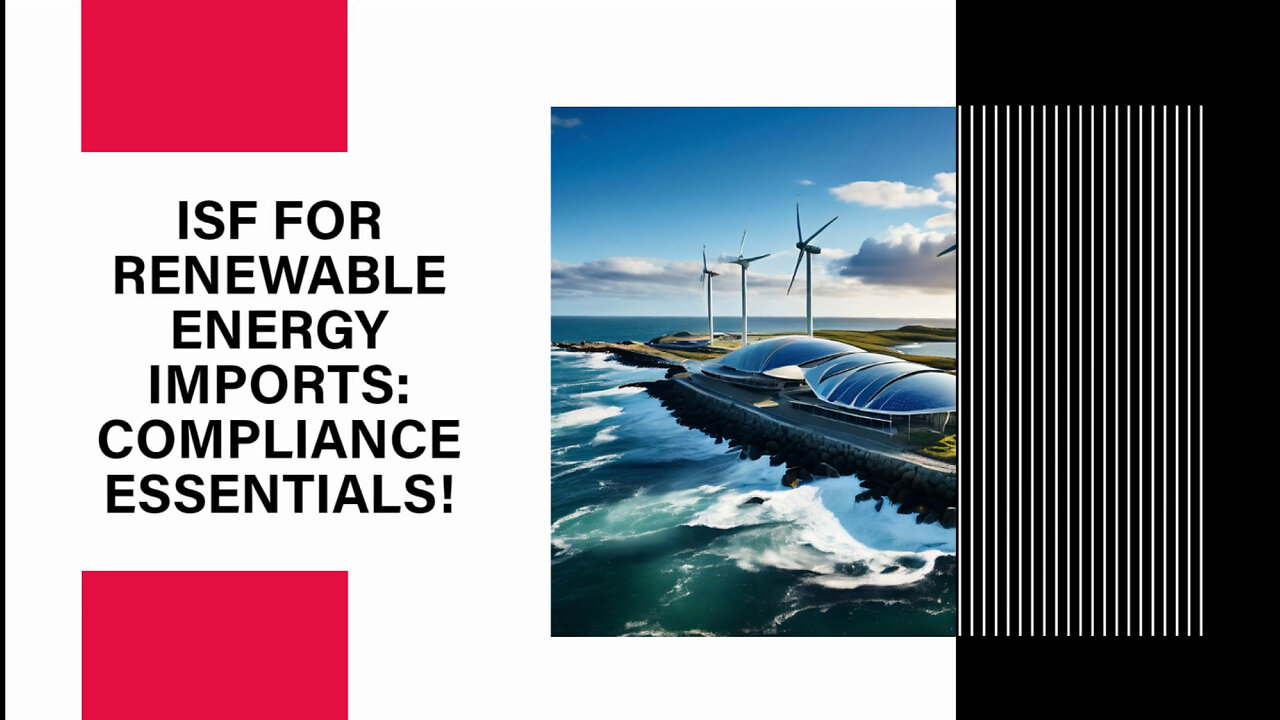Premium Only Content

Mastering ISF: Navigating Renewable Energy and Environmental Goods Imports
ISF Depot // 661-246-8217 // customs@isfdepot.com // www.isfdepot.com
Welcome back to our Customs Brokerage series! Today, we will be discussing the Importer Security Filing (ISF) requirements for renewable energy and environmental goods imports. These types of imports are subject to specific regulations and guidelines due to the nature and importance of the products. As a customs broker, it is your responsibility to navigate these regulations to ensure a smooth import process for your clients.
The first step in handling renewable energy and environmental goods imports is determining whether they fall under the requirements of the ISF. The ISF is mandatory for shipments entering the United States by ocean freight and requires specific data elements to be filed with Customs and Border Protection (CBP) at least 24 hours before the goods are loaded onto the vessel.
When filing the ISF for these types of imports, there are additional considerations to keep in mind. Accurate and detailed information about the commodities being imported, including the Harmonized System (HS) code, country of origin, and manufacturer details, must be provided. Additionally, if the goods have environmental certifications or are subject to specific regulations such as those by the Environmental Protection Agency (EPA), that information must also be included.
Another important aspect is the customs bond requirement. A customs bond acts as a financial guarantee between the importer, the customs broker, and the CBP. For renewable energy and environmental goods imports, the bond amount may be higher than usual due to their value and potential impact. Working closely with your clients to determine the appropriate bond amount will ensure a smooth customs clearance process.
As a customs broker, you play a crucial role in compliance, especially when it comes to renewable energy and environmental goods imports. These goods may require specific permits, certifications, or undergo environmental impact assessments prior to importation. It is important to work closely with your clients to ensure all necessary paperwork and documentation are in order to comply with regulations.
Staying up to date with changes in regulations related to renewable energy and environmental goods imports is also essential. This will enable you to provide accurate advice to your clients and facilitate a compliant and trouble-free import process.
In summary, when dealing with renewable energy and environmental goods imports, filing the appropriate ISF and obtaining the correct customs bond are crucial steps. Compliance with regulations and staying informed about changes in legislation will ensure a smooth import process for your clients. Thank you for joining us today, and stay tuned for our upcoming videos where we will continue exploring different topics related to customs brokerage and international trade.
#usimportbond #isfcustomsbroker #uscustomsclearing #isfentry
Video Disclaimer Here: This tutorial is independent and not affiliated with any US governmental entities.
-
 40:43
40:43
Kimberly Guilfoyle
8 hours agoDems Double Down on Delusion-Why? Live with Tony Kinnett & Bo French | Ep.202
77.8K35 -
 1:28:42
1:28:42
Redacted News
6 hours agoBREAKING! SOMETHING BIG IS HAPPENING IN EUROPE ALL OUT WAR IS COMING AGAINST RUSSIA, TRUMP FURIOUS
121K287 -
 47:50
47:50
Candace Show Podcast
7 hours agoBREAKING: Judge Makes Statement Regarding Taylor Swift's Text Messages. | Candace Ep 155
113K119 -
 1:14:23
1:14:23
Josh Pate's College Football Show
3 hours ago $0.29 earnedCFB’s Most Hated Teams | FSU & Clemson Future | Big Ten Win Totals | Star Rankings Overrated?
14.5K -
 1:33:47
1:33:47
CatfishedOnline
5 hours agoGoing Live With Robert - Weekly Recap
27.8K -
 55:18
55:18
LFA TV
1 day agoEurope’s Sudden Turn Against America | TRUMPET DAILY 3.6.25 7PM
32.2K3 -
 4:21
4:21
Tundra Tactical
5 hours ago $2.12 earnedPam Bondi MUST Enforce Due Process NOW!
23.7K1 -
 56:42
56:42
VSiNLive
6 hours agoFollow the Money with Mitch Moss & Pauly Howard | Hour 1
48K1 -
 1:05:32
1:05:32
In The Litter Box w/ Jewels & Catturd
1 day agoShalom Hamas | In the Litter Box w/ Jewels & Catturd – Ep. 756 – 3/6/2025
103K37 -
 1:23:00
1:23:00
Sean Unpaved
7 hours ago $3.19 earnedNFL Free Agency
53.4K4